Northern farmers urged to focus on actions they can control
 © Duncan Andison/Adobe Stock
© Duncan Andison/Adobe Stock Stressed out farmers should accept what they can and cannot control and act on factors within the farmgate to manage their business and protect margins.
Pressures of falling subsidy payments, rising costs and erratic policy-making from government are not things that food producers can control, an audience at Darlington Farmers Auction Mart, County Durham heard at a roadshow on 8 November.
See also: What is ‘total grazing’ and will it work in the UK?
The message of the Carbon Calling team – a group of famers in northern England focused on leading farmer-to-farm interaction and driving change through knowledge exchange – in its first roadshow event was to “control the controllables” and have a positive mindset.
Lincolnshire beef and sheep consultant and farmer Dr Liz Genever and Cumbrian farmer Nic Renison challenged farmers present to proactively look for ways to change their own system, rather than looking for “subsidy, lotions and potions or kit” to make everything better.
The 100 farmers in the audience were advised to do the following to help mental health and decision-making:
- Identify a time in the day, such as when moving fences, feeding cattle or walking the dog, to reflect on how things are going
- Identify negative thoughts and look for more positive things to focus on. Native Americans used to refer to this as “feeding the good wolf”, believing there is a good wolf and bad wolf inside each of us
- Control what you can control – how you farm, what breeds you have, how you market your stock, what you spend money on and how many inputs you depend on
- Join discussion groups and meet with people to talk about issues, get good advice and share your frustrations.
Advice is valuable
Sheep farmer Richard Brown from Stockton-on-Tees said he had drawn on advisers and farmers for inspiration after a major change in the family business.
Previously farrow-to-finish pig farmers, the Browns went into ruminants rather than redevelop a tired pig farrowing shed.
However, they kept their growing unit and contract grow more than 1,500 pigs a year for a large producer.
The business bought 26ha (65 acres) to add to 12ha (30 acres) the family already owned and started farming 100 Beltex cross Texels.
Richard was advised by a vet to look at rotational grazing and then joined the County Durham Beef and Sheep Group, which was instigated by vet Ben Strugnell of Farm Post Mortems.
After joining the group and talking to other farmers, Richard was persuaded to buy Lleyns.
He now runs a total of 500 breeding ewes and 150 ewe lambs, as well as six Beef Shorthorns.
Making use of the grass on the 38ha (95 acres) he owns, and any other rented ground, is the priority, he added.
The Browns have adopted rotational grazing and experimented with paddock size, settling on a system of 250 ewes and lambs on eight 2ha (5-acre) paddocks through the summer.
“I don’t like spending money if I don’t have to. If it makes sense to sell store lambs, I will, and if it makes sense to feed, I will.
“The priority now is managing grass and breeding sheep that don’t need lots of inputs thrown at them.
“I used about 5t of cake when we had 100 sheep, and now we rotationally graze, we still only use about 5t of cake and we have 500 breeding ewes.”
Positive about the future
Mixed farmer Stuart Johnson from West Wharmley, Hexham, said he was positive about the future and had less day-to-day stress in his life since he slashed his input costs over a seven-year journey into soil health and regenerative farming.
“My variable costs have fallen over the years while input costs have actually been increasing,” said Stuart.
“I tend to cost my enterprises every six months, and our cow variable costs have fallen from between £600 and £650 a cow to below £300 a cow.”
He said this makes his business resilient. “I don’t care if fertiliser prices are high, as it doesn’t really affect us.
“We used to buy up to 90t of fertiliser. [We’ve used] less than 10t for each of the past two years.
“We still have stress and worries, but they are different now. Our focus is not about yield, it’s about margin from yield.”
Stuart listed some of the changes his family had made to lower costs:
- Outwintering suckler cows until the new year, halving the housed period
- Direct drilling – saving money on ploughing
- Mob grazing with sheep and cattle in an adaptive grazing system
- Following the 6-3-4 principles of Understanding Ag
- Producing compost teas and foliar feeds with woodland soil and fulvic/humic acids.
He stressed that the changes he had made across the 404ha (1,000 acres) he helps farm were purely financially driven at first.
As a tenant farmer, he has to find rent each month, and this had helped drive his decision-making.